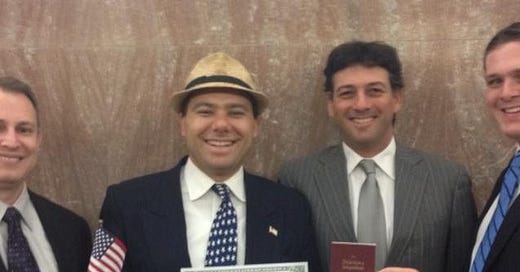That Time I Applied to Be Dean
Before I moved to Georgetown Law, I was invited to be part of the dean search at the University of Tennessee College of Law. Here's that story, including my DEI statement.
Just over a year ago, in August 2021, I got an interesting call from Glenn Harlan Reynolds, the longtime University of Tennessee law professor perhaps better known online as the “Instapundit.” It seems that UT Law had botched its dean search the previous year and so was casting I wider net. Would I be interested in applying? (Actually, I think he asked whether I knew anyone who might be interested, but given that Glenn knows more professors than I do—and certainly all of the libertarian/conservative ones—it was clear that he was taking my temperature.)
It was this experience and process, which I detail below, that got me thinking, “Hmmm, if people are thinking about me for these kinds of jobs, maybe I ought to consider, and think more outside-the-box, about potential next career moves as I hit middle-age.” In late October, I had dinner with Georgetown law professor Randy Barnett. By the second bottle of wine, the plan for me to become executive director of his Center for the Constitution began hatching. The rest is history, but first came this Tennessee story.—IS
It was an intriguing proposition. I’d been at Cato nearly 14 years and was generally happy, but was it time to think of next steps? I’d been to Knoxville several times and liked it—and knew a few people living there, let alone in Nashville—but had never imagined myself living there. Was this even a serious idea or was I just a token non-progressive (and non-full-time-professor) being asked to round out the applicant pool?
The first thing I did, of course, was to run this by my wife. When Kristin didn’t reject the idea offhand—which she did about a decade earlier, before we were married, when a headhunter called me to apply to be founding dean of Boise State’s School of Public Service—I knew I had to consider it further.
So I did plenty of due diligence, talking to professors (senior and junior), students, associate deans—I remember one long and detailed conversation about the budgeting process—and even local politicians and state policy people. It certainly seemed to be a legitimate query and a fascinating opportunity.
Well alright then, I guess I’d better prepare my application materials. The dean-search committee asked me to submit by early September an interest letter and CV, plus statements of leadership philosophy and DEI (of course), and references. There would be first-round virtual interviews in October, then finalists would be brought to campus and an offer extended by Thanksgiving. Game on!
I put these materials together over the course of a couple of weeks, including a key push at the home of my Louisville law professor friend Luke Milligan, where I spent a week with my sons this past August. (I vividly remember waking up early in his carriage house to articulate my leadership philosophy before getting a start on a day full of speaking engagements and bourbon-drinking.) And I sent them off around Labor Day.
Then I waited. And waited. And waited. I was busy traveling and campaigning, and having my usual peripatetic fall ahead of the new Supreme Court term, but at some point it became clear that I wouldn’t even be invited for a first-round interview.
I was pissed off. Not because I wouldn’t get to be dean—that was a fun day dream for a while, but I knew that this would be an uphill climb as an unconventional candidate—but because they’d wasted my time. I’d devoted 15-20 hours to this enterprise and it was time I had to carve away from family, sleep, and what I call “recharge time” (working out, leisure, etc.) during a very busy period.
It turns out I probably was a token—though Glenn, who wasn’t on the selection committee, didn’t know that ahead of time. The search committee, desperate to get a diversity hire, ended up picking someone who leveraged her offer to get a better one elsewhere. So the dean search blew up a second year. (Finally this year there’s a new dean, but I neither know nor care about the details of this search, other than to note that the new dean has had a long and distinguished career and easily fits the deanly mold.)
But whether the committee’s invitation to apply was sincere or not, I’m sure that my DEI statement, focusing on equal opportunity and individual flourishing rather than identity politics and racial spoils, disqualified me. You can read it below the paywall—so please consider subscribing!
Keep reading with a 7-day free trial
Subscribe to Shapiro's Gavel to keep reading this post and get 7 days of free access to the full post archives.



